With both the Playstation 4 and the Xbox One releasing last November, 2013 sort of marked the end of an era, although you wouldn't notice from the quality of the games. There was a nice mix of excellent triple AAA titles and innovative independent releases that made the year a fun and exciting experience the whole way through. I know it was a great year because there were so many really good games in great franchises that didn't even make the list.
Best of 2013
10. The Stanley Parable (PC)
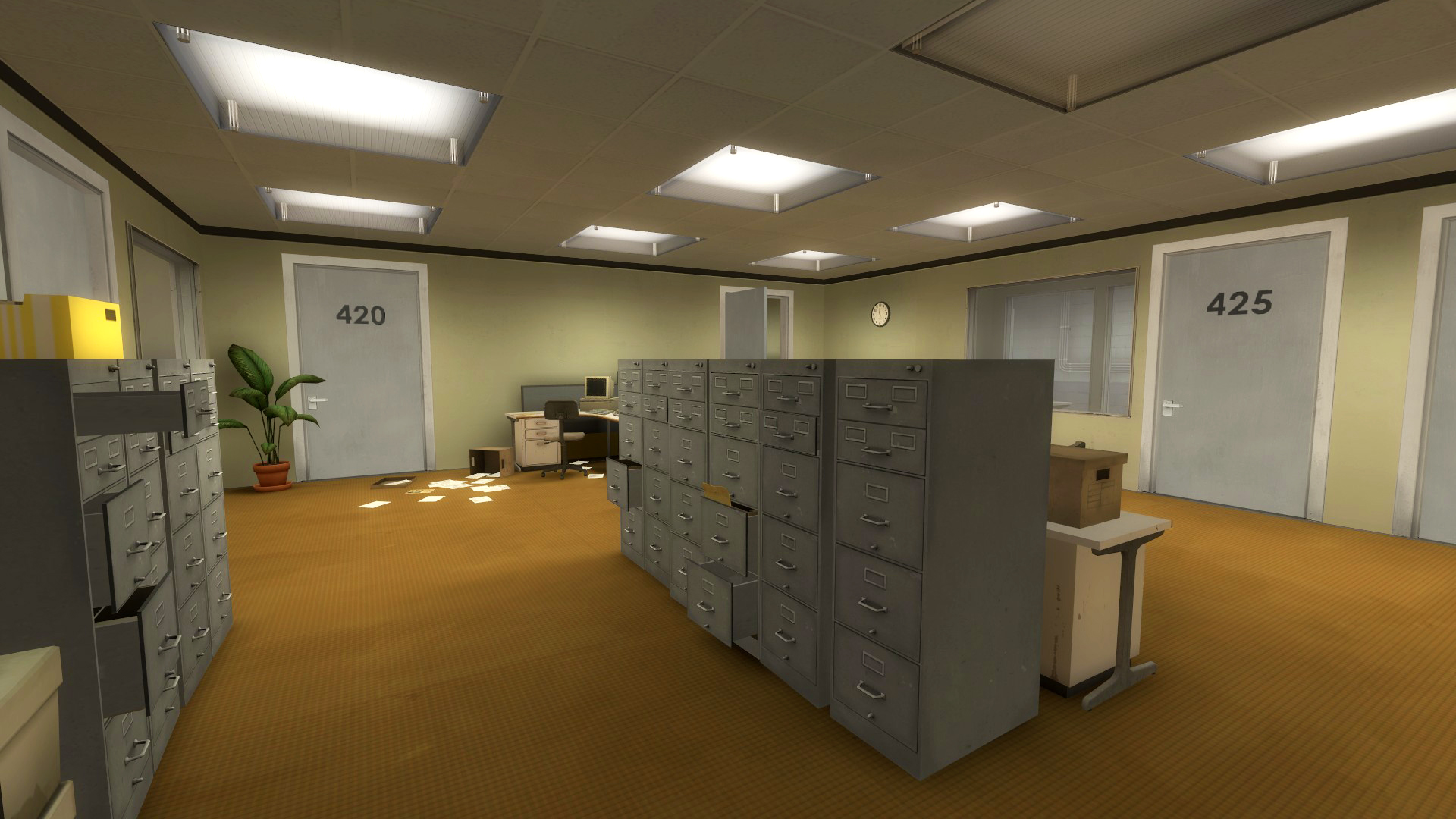
The Stanley Parable was originally a free Source engine mod, but in its conversation to full product it was completely overhauled and remade into what it is now. What it is now is a bit harder to describe. You play as (or are) Stanley, an office worker who one day finds himself alone in the building. A narrator describes your actions before you do them, and you can follow all of his directions to quickly reach an easy yet unsatisfying conclusion. But the real meat of the game is in not doing what you're told. There are tons of ways to disobey the narrator hounding your every move, and they usually result in something interesting, be it a new place you can go, a new insight into game design, or just a funny rant. The game's mix of playing with and subverting expectations while commenting on the nature of choice and interactivity in games is never boring, and the sense of humor keeps it light. You'll definitely understand what the game is doing better if you have a greater than average understanding of gaming history and culture, but anyone can pick it up and at least get a few laughs.
9. Saints Row IV (Multi)

Saints Row: The Third is the artistic pinnacle of the Saints Row series, as weird as it is to use the word "artistic" in that context. In comparison, IV sort of feels like a bloated expansion pack or downloadable add-on, taking place in the same city and completely screwing with the series' framework of open world crime game by turning you into a super hero. In case you don't know, the game's basic premise involves (1) the gang's boss becoming President of the United States in the opening sequence, followed by (2) aliens invading Earth, which results in your capture and insertion into (3) a computer simulation of the city, which you are able to hack in order to essentially (4) gain a variety of super powers. It's nuts, in a series which is known for redefining what nuts actually means in video games. It's also incredibly fun to play, which is the key. I like the other Saints games I've played, but for the most part what you're actually doing is driving and shooting. In Saints Row IV you're running at hyper speed, leaping many stories at once, and basically breaking the world for your own amusement. It's just about as pure as enjoyment can be in the medium. As a bonus, they still have a great handle on the characters, and they're still a lot of fun to hang out with.
8. Super Mario 3D World (Wii U)
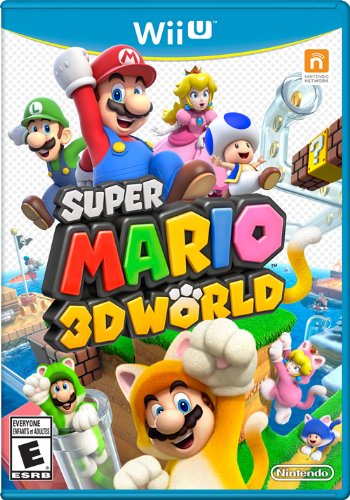
Along with a couple other releases, Super Mario 3D World justifies owning a Wii U, even if the system's future for anything resembling competent third party support looks bleak. It expands on the core gameplay of Super Mario 3D Land, which mixed elements of both 2D and 3D Mario games into a slick and satisfying experience, adds 4 play support and HD graphics, and basically taps the basic mechanics for as much action as they can handle. It's not the greatest Mario game ever - having to support multiple players of varying skill inherently limits the potential of the game design. But it's still really fun to play, even alone, though with friends or family is certainly preferable. It's amazing how this series manages to still be exciting so many years later with the same core ideas.
7. Tomb Raider (Multi)
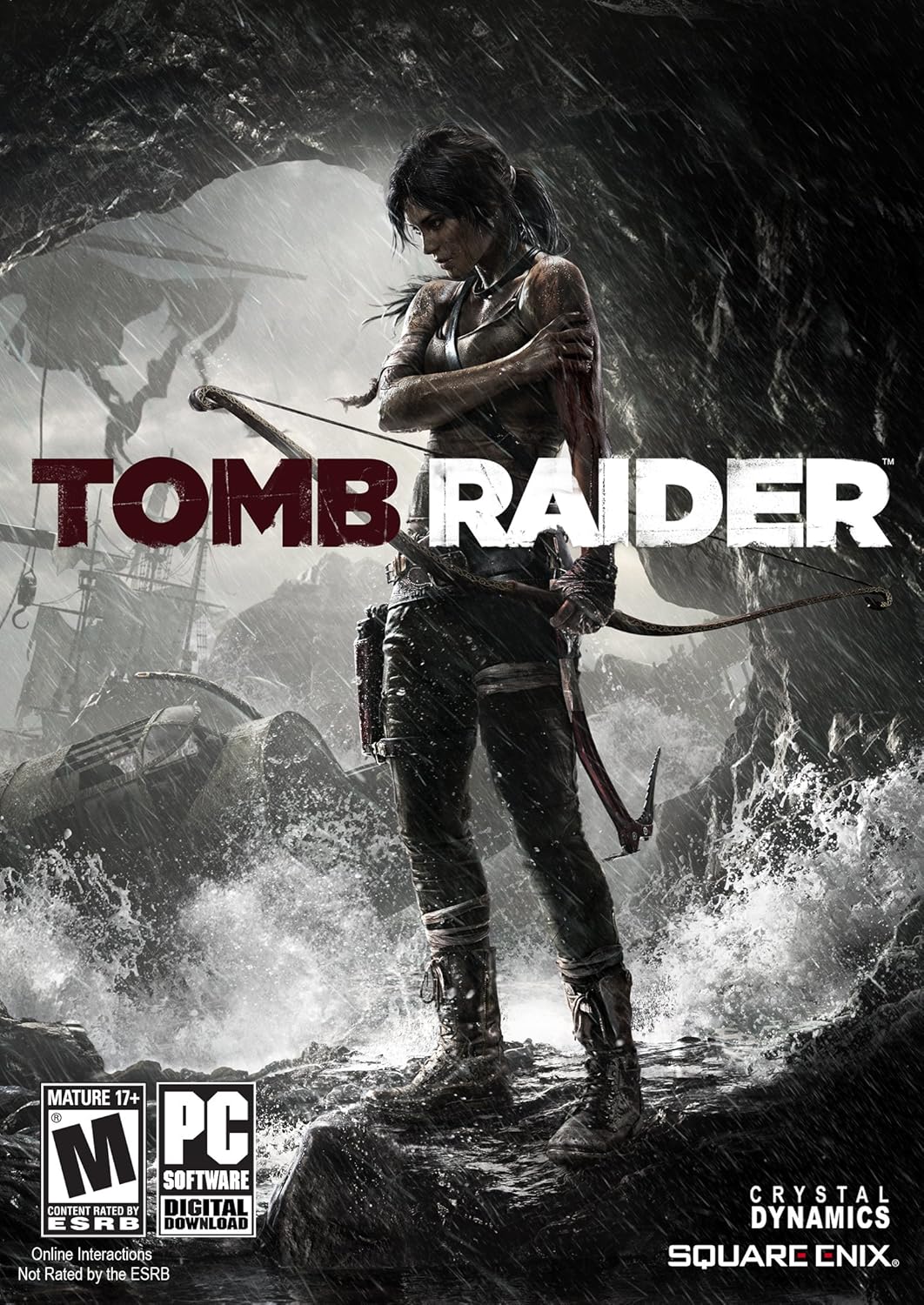
The cycle of innovation and imitation in games can be a pretty funny thing. When Uncharted: Drake's Fortune came out, featuring gunplay, climbing through exotic environments, and solving puzzles in ancient tombs, it was hard to miss the influence from the Tomb Raider series. And now with this new Tomb Raider featuring a more down-to-earth take on its protagonist, cover-based shooting, and a focus on quick traversal over thoughtful rumination on your surroundings, it's hard to miss the influence coming from the other direction. But Tomb Raider's isn't quite an Uncharted clone, having as it does a greater focus on survival, backtracking, and an essential desperation that goes a long way to define it. I wouldn't say either approach is really better, and I'm glad we're getting multiple takes on a central concept that is just so darn appealing. The new Tomb Raider still feels like Tomb Raider while managing to stay modern, and I find it hard to say it's not the most approachable and well-executed game in the series.
6. Grand Theft Auto V (Multi)
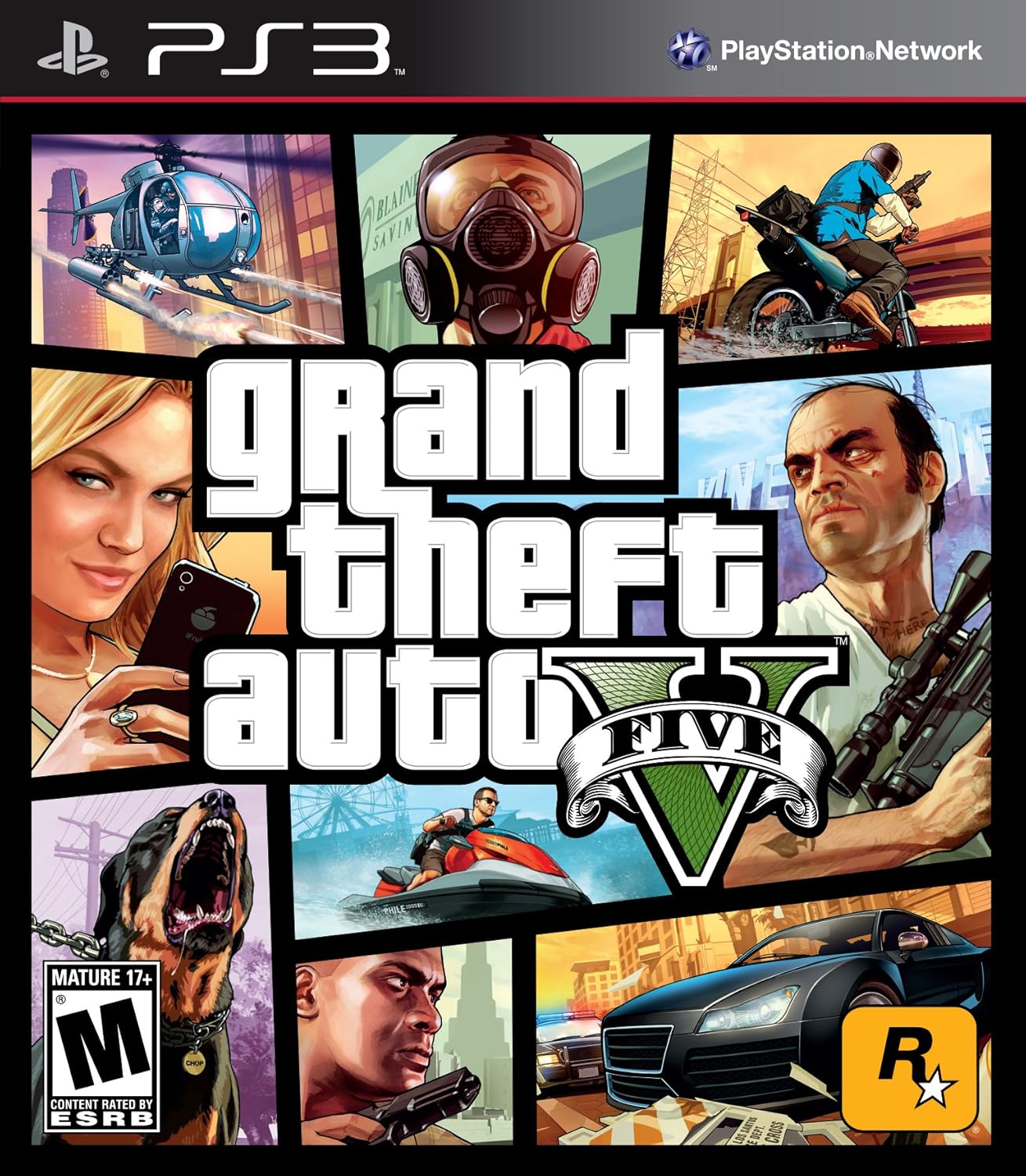
Grand Theft Auto V is the most fun I've had with the series in nine years. In many ways, the game has problems, from its questionable ethics to some weird design snags that other open world games have already solved to a plot that goes a lot of places that it probably doesn't need to. It's kind of a mess, really. But San Andreas is one of the most fully realized worlds I've ever seen in a video game, from its picturesque winding mountain roads to its gaudy downtown storefronts. It really feels like a huge place. And it's honestly a fun place to hang around in. The main gameplay focuses on driving to different places to shoot different people from behind cover, and in that way it's not much different from the last game. But there's a lot more big moments this time around that you remember for months afterward, and it all handles a little better, and the game's tone matches its content with less confusion. And the heists... well, the heists are awesome. I only wish there were more.
5. Brothers: A Tale of Two Sons (Multi)

People like to make fun of the story in games a lot. And a lot of times they're right. But there are certain things that games can do with storytelling that just aren't possible in film, novels, or any other medium. Brothers is a prime example of that. In it, you control two brothers at once, each hand controlling one or the other. It may sound like that gets confusing or frustrating, and it does from time to time. But for the most part it's manageable. At least enough to get you through the few hours it takes to complete the story. During that time it's a solid puzzle game, with clever and intuitive solutions and some satisfying temporary mechanics. The game's real strength though is the story, which is touching, unforgettable, and much, much more effective because it's a video game. Play it and you'll see why.
4. Bioshock Infinite (Multi)
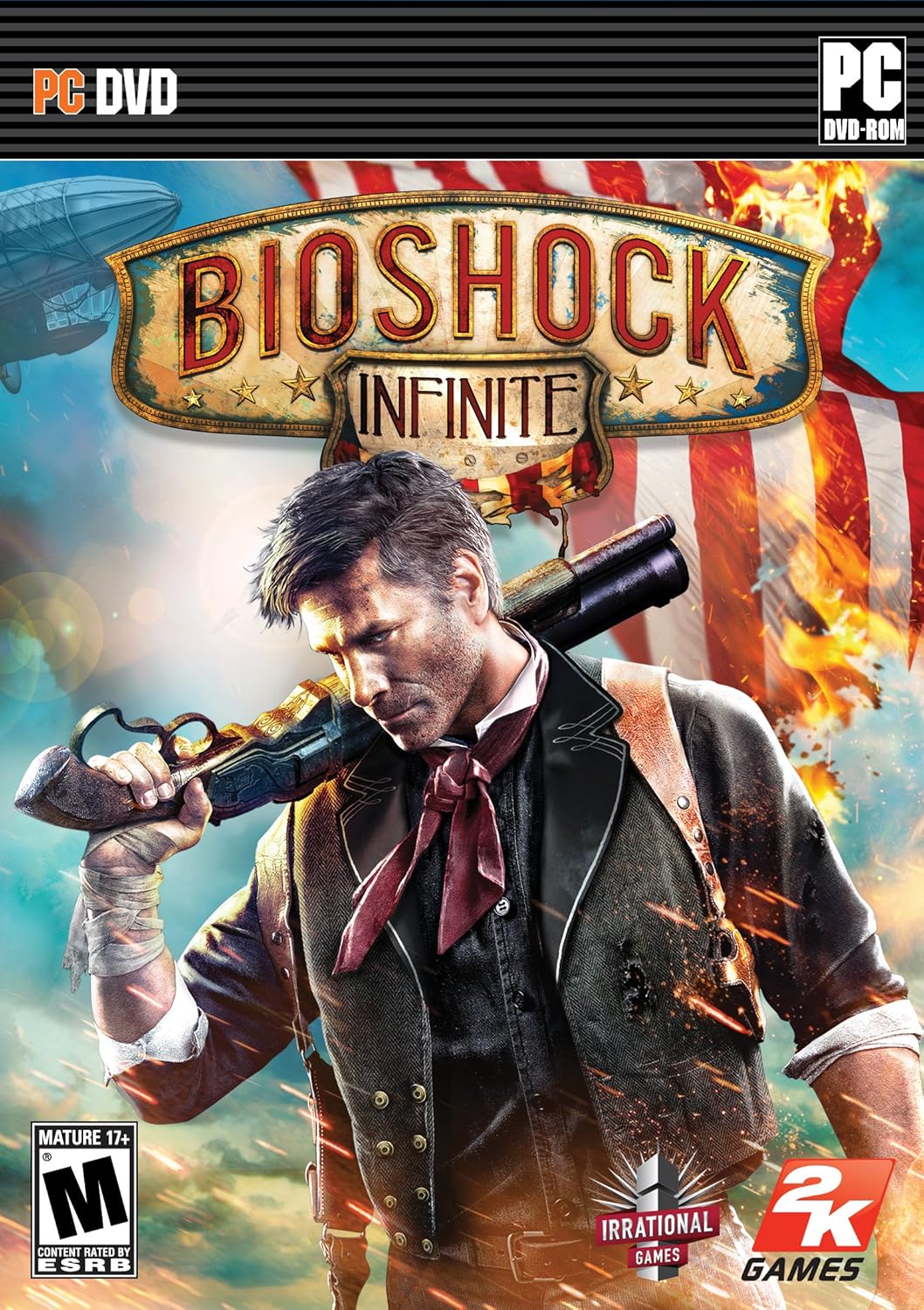
I was honestly surprised by the tons of criticism this game received starting immediately after and lasting for a long time following its release. The reactions are strong and generally understandable, but I have a hard time agreeing with them. I think people wanted things from Infinite that it wasn't prepared to give them. It has a lot of subjects it touches on without fully exploring, from racism to totalitarianism and all kinds of things that would be hard to do justice to while trying to be an action game and tell a crazy sci-fi story. And ultimately, Bioshock Infinite wants to be an action game that tells a crazy sci-fi story. The shooting at its best provided some of gaming's best thrills this year, the world of Columbia and its inhabitants are well-conceived and fun to look at, and the main characters are excellently conceived and portrayed by the writers and voice actors, anchoring a plot that at times is over the top but ultimately serves its primary goals well. Infinite is messy, but I think it's a pretty wonderful mess.
3. Gone Home (PC)

Gone Home's designer and writer Steve Gaynor actually worked on the Bioshock series for a while, but he left it to do something smaller and more personal. I'm glad he did, because Gone Home is special. It's another game that tells a story in a way only a game can, having you uncover its details through examining an environment rather than actually seeing anything play out in front of you. People talk about it not being a "real game", whatever that means, and saying that the story would be better as a book or a movie. This is nonsense. A video game is the only thing Gone Home could possibly be. It shows that you can use the familiar mechanics of looking at and touching things to tell a story you don't see in mainstream games, and reveals how silly it is that you don't. There's no reason every game has to involve killing hundreds of people to get a point across, and yet there are still people out there insisting that there is. Gone Home gave me one of the best and most authentic emotional experiences I had in 2013, and I wish more people were open to seeing it the way I did.
2. The Legend of Zelda: A Link Between Worlds (3DS)
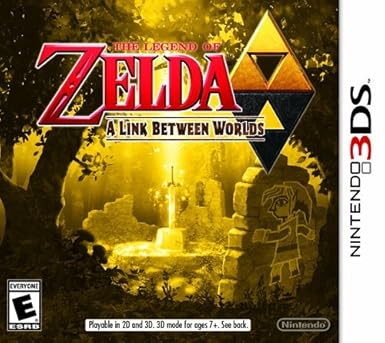
My friend mentioned that whenever a new Zelda game comes out, a lot of people crap on the previous one. This is mostly true. I don't think it will happen with A Link Between Worlds though, because it seems like almost everyone who has played it describes it "the best Zelda in X years", where X is the number of years since the last Zelda game they truly loved. In my case, A Link Between Worlds is my favorite Zelda game since Majora's Mask, and since that's my favorite video game ever... yeah, I like A Link Between Worlds a lot. It takes the basic framework and world design from A Link to the Past, a fan favorite, and modernizes it with the best controls the series has ever had (yes, ever (except for the 3DS' terrible form factor)) and many updates to the functionality. It's also the least restrictive Zelda game in a long time, letting you wander around the whole world after the relatively brief tutorial and letting you tackle most dungeons in whichever order you desire by letting you rent or buy whatever items you need to get through them whenever you want. The dungeon design is fantastic, the boss fights are a blast, and the ability to flatten and move along walls really opens up the possibilities for getting around. In short, it understands what people love about Zelda better than any game in over a decade, and just lets them have that. A bit pandering maybe, but it works.
1. The Last of Us (PS3)
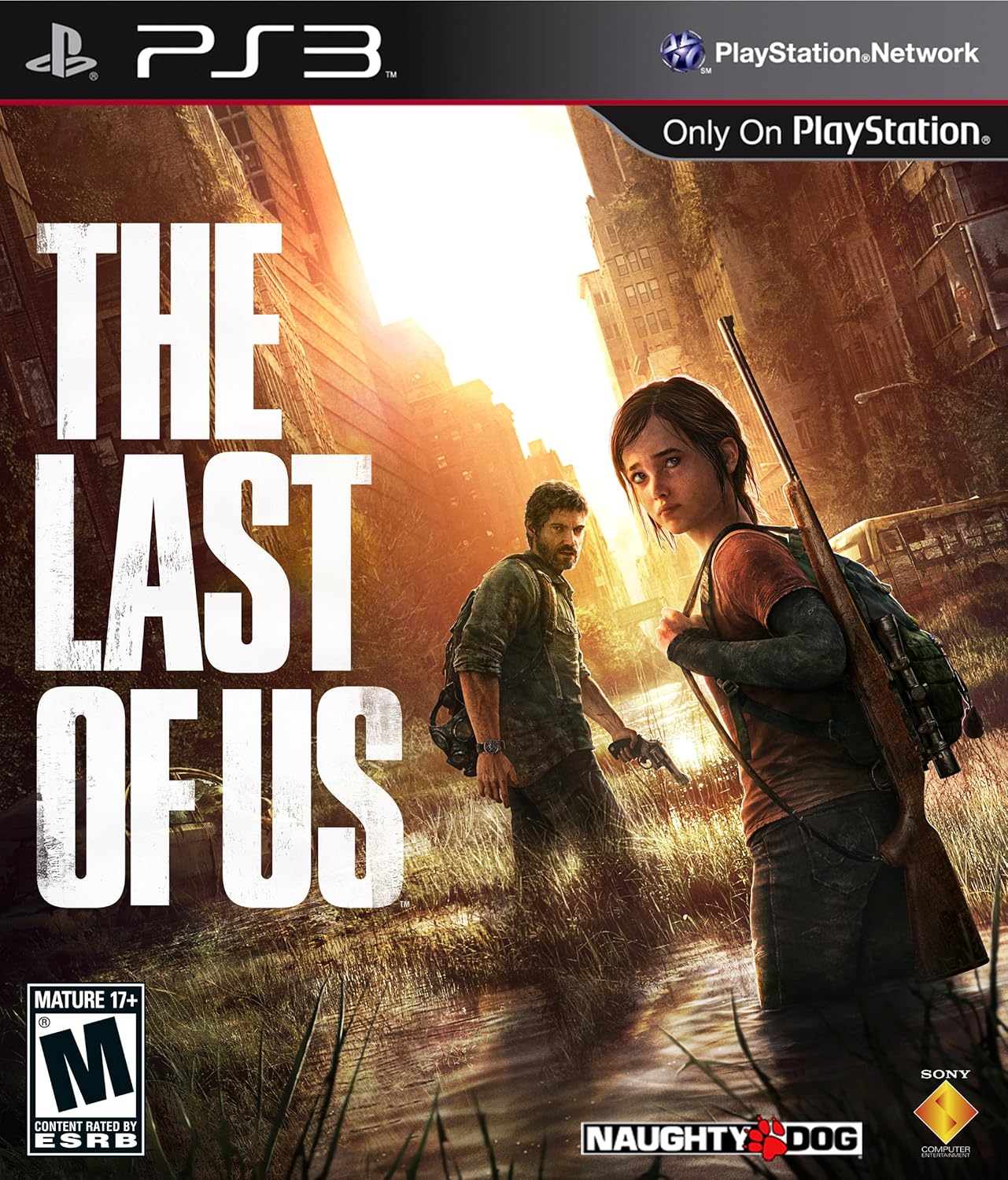
There are two types of The Last of Us players: those who love the gameplay and story, and those who only love the story. I'm one of the former. I have a hunch that people who didn't like the gameplay were going about it the wrong way. I don't usually like using the "you're playing it wrong" argument, but with The Last of Us, it's easy to approach it from too much of an action or stealth direction, when your best bet is to blend the two. It's a game where you don't want to be mobbed by enemies, and the best way to do that is to both avoid being detected and actively take out any enemies you can without them noticing in order to thin out their numbers. You have a variety of tools at your disposal to get the job done, from improvised weapons you can use up close, to traps you can build and use from a distance, to guns in case you get desperate. Some people like it on easy, some people like it on hard, but if you can make the combat in The Last of Us work for you, it's among the most satisfying that you can experience. And as I mentioned, the story is awesome too. Assisted by fantastic graphics and sound design and great voice acting and mo-cap work by the cast, they take something as tired as yet another zombie apocalypse and wring it for all it's worth emotionally. It has all the weight and power of The Walking Dead while still having a robust action/adventure game behind it. It's just one of the best games to come out in years.
Delayed Entry
This is the best game that wasn't released in 2013 but I didn't play until then.
Super Mario Galaxy (Wii)
With all due respect to Super Mario 3D World, Super Mario Galaxy is the real deal. Despite being six years old when I played it, it was amazing how good it was. It takes what I loved about Super Mario 64, improves on its faults, and brings it way into the future with its take on how crazy a platforming game can act while still being comprehensible. While some areas resemble a typical Mario environment, it really shines when it takes the "galaxy" part literally and has you hopping between interstellar objects floating in space with their own gravity. It's incredibly disorienting when you first start running around on what appears to be the ceiling, but once your mind reorients, you'll find yourself doing all sorts of crazy things and not thinking twice about it. As a bonus, playing it after watching Gravity gave me multiple opportunities to freak myself out by nearly floating away into the endless void. The motion controls are merely competent and I wish I could have played it in something higher than 480p, but I can't blame the game for Nintendo's issues with hardware.
Monday, January 13, 2014
Best Games of 2013
Monday, January 14, 2013
Best Games of 2012
A lot of people will tell you 2012 was a disappointing year for boxed games, and I’d agree with them on a few counts, at least compared to the last couple years. On the other hand, it was a great year for alternative, downloadable games, and there were plenty of new experiences to make the increasingly long wait for new consoles easy to forget.
Best of 2012
9. Mark of the Ninja (Multi)

Mark of the Ninja was one of several games this year to rely on stealth for the meat and potatoes of its gameplay, and while it wasn’t my favorite, it was certainly interesting in its approach. Most stealth games tend to anger their players at some point or another when they get caught and don’t know why, but that’s never a problem with Ninja, where thanks to clever interface and game design, it’s perfectly clear at any moment why you can or cannot be detected by enemies. Add in the beautiful 2D art and animation, extremely fluid controls, and useful variety of weapons and gadgets, and there’s a lot to like here.
8. Journey (PS3)

I wasn’t as in love with Journey as some other people, as I kind of felt like we already got some of what ThatGameCompany was going for with their previous game, Flower. Even if you aren’t grabbed by the game’s simple play of jumping around and sliding down hills and wordless, vague story though, it might be worth discovering on just a technical level. The graphics are gorgeous – I don’t think anyone’s ever made a desert look this attractive before. And the unique multiplayer creates an experience that’s possibly worth the purchase price by itself. It’s amazing how easy it is to prevent people on the Internet from being jerks just by taking away their ability to talk. It’s a game that for some is a transcendent pleasure, and for others a boring experiment that doesn’t work. I found myself closer to the former on the spectrum.
7. Sleeping Dogs (Multi)
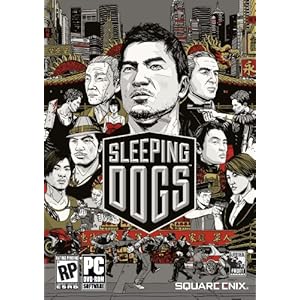
I never played a game in the True Crime series, so I was uninterested when they announced a new one set in Hong Kong, even after it stopped being a True Crime game and got the title Sleeping Dogs. I kept hearing about it after it came out though, and finally gave it a shot, which turned out to be worth it. Sleeping Dogs is the best modern open world crime game since Grand Theft Auto IV, and you can make a strong case that’s it’s actually better. Like plenty of games since the GTA series became popular, it offers a few innovations on the formula that will only make the genre more accessible, but it’s also worth checking out just for the game itself, which is just the right length and level of maturity. Inspired by Hong Kong action movies, it tells a totally competent undercover cop story with some great voice acting, has a variety of things you can do to pass time, and most important, the core missions are actually a lot of fun, with decent car and foot chases, acceptable gunplay, and best of all, a robust melee combat system that takes obvious inspiration from both kung fu cinema and the great hand-to-hand battles in Batman: Arkham Asylum and its sequel. It has its shortcomings, but I’d recommend it to anyone who needed a fix while waiting for the next GTA.
6. Darksiders II (Multi)
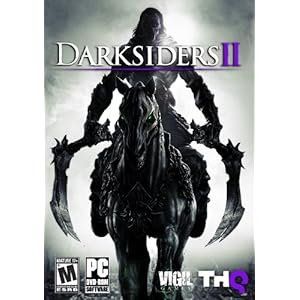
I know a lot of people were really disappointed with Darksiders II. And I don’t really get it. It combines fast-paced, stylish character action in the vein of Devil May Cry with puzzle-focused dungeon exploration in the vein of The Legend of Zelda just like the original Darksiders, and also adds fluid traversal/platforming in the vein of Prince of Persia. I realize that that’s a lot of “in the vein”, but that’s what the series is. Where the game definitely falters is in the addition of an RPG-style randomized loot system, which makes some sense when you think about the lure of always finding better gear to keep up with the increasingly tough enemies, but which takes away the definite thrill of discovering things in this kind of game. It’s certainly odd to go through the trouble of solving a uniquely designed, one-time puzzle and get rewarded with a randomly generated item that may or may not be better than what you already have. It’s also sort of dull from a story perspective, sticking to mundane fantasy worlds where Darksiders mixed that up with a destroyed modern earth in interesting ways, and not being allowed to advance the plot by virtue of taking place at the same time as the first game. Still, it’s full of well-made dungeons and is just a lot of fun to play, so I have a hard time taking much issue with it. Not what it could have been, but still good.
5. Far Cry 3 (Multi)
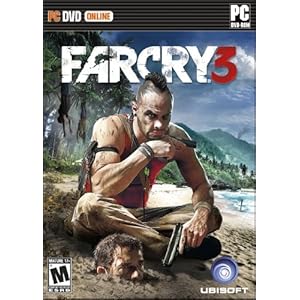
Far Cry 2 was a brilliant game, but a lot of people didn’t see it that way, and I don’t blame Ubisoft for a lot of decisions they made with the sequel. In fact, I think some of them were for the better. Far Cry 3 combines the setting and basic premise of the first game (regular guy trapped on a tropical island) with the basic gameplay and structure of the second (you wander around an open environment in first person, fending off attackers from all sides), and adds a bunch of systems and poorly-thought through plot elements. You can now take over outposts to prevent enemies from ever appearing in the same area again, and you can gain experience points to unlock new abilities, and you can hunt and skin animals to craft items that let you hold more supplies and boost your stats. It makes it overall a friendlier world to be in, which is good for accessibility, but undeniably damages the unique feeling of lonely desperation you got out of the last game. Still, it’s a blast to screw around, whether you’re burning a patch of jungle to the ground, silently knifing every thug in the immediate area, or getting into a hectic car chase that will end in a painful explosion and lots of gunfire. Just make sure to turn off some of the more intrusive interface elements and ignore the poor attempts at story and character.
4. Hotline Miami (PC)

Hotline Miami. It’s sort of like if you made an entire game out of those brief scenes in Drive where Ryan Gosling killed goons with his bare hands. It’s an extremely fast action game. But it’s also a stealth game. And a puzzle game. Your goal on each level is to kill everyone you see before they can kill you. You can knock them over by bashing through a door they’re standing behind. You can shoot them or smash them with guns or various objects you find. If they’re lying on the ground but not dead yet, you can smash their heads into the floor, or snap their necks, or worse. Playing it can feel like a bad trip – the faux-80s dance soundtrack (there’s the Drive influence again) is always pounding, and the graphics are ugly pixelated garbage, and lights are flashing and the ground is kind of moving in a disorienting way. The story is nonsense, and it tricks you into thinking maybe there’s something deeper under all this violence, before it pulls out the rug and you finally learn it really is all about the violence. You will die hundreds of times, and you won’t care because you can start a level again instantly and it’s just so fun to play. Hotline Miami is unique and unforgettable.
3. Mass Effect 3 (Multi)
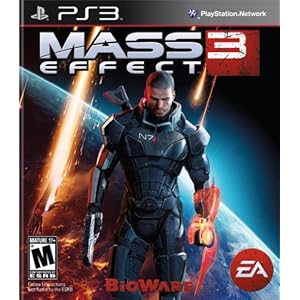
Mass Effect 3 caught a lot of heat for its (honestly underwhelming) ending, but everything before that lives up to the challenge of bringing an exceptional science fiction saga to a conclusion. It lacks the thrill of discovering a whole new galaxy from Mass Effect, and doesn’t have the huge, diverse core cast of Mass Effect 2. It does give you the sense of a whole galaxy struggling to survive, and brings back a lot of the series’ larger conflicts and resolves them in satisfying and often deeply affecting ways. It’s also the most fun the series has been to play, as long as you don’t mind doing a whole lot of shooting from behind cover. I wish the conclusion cared a little more about how I spent the previous 80 hours it took to get to that point in the series, but it’s still a game worth playing, and has payoffs a fan of the series would want to see.
2. Dishonored (Multi)
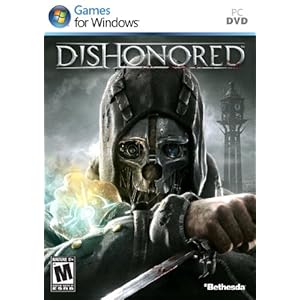
Dishonored deserves praise just for the fact that it exists. A big budget action stealth game with magic powers, a somewhat cartoony graphic style, and a setting that is hard to sum up more succinctly than “whale oil-punk”? I still wonder how it got made. But to only praise it for the miracle of its existence is to ignore that it’s actually a really good game. You are tasked with exacting vengeance on the people who have had you falsely accused of treason and thrown in prison (from which you promptly escape), and your options in doing so are vast and always interesting to discover. You have a variety of powers and equipment at your disposal, and it’s up to you whether you try to sneak by enemies without being seen or run around killing them like a madman. Your options are a bit limited if you want to avoid murder, and the story isn’t too interesting, and they don’t really make much use of the extremely famous voice cast. These are minor issues though when you take in the sheer depth and inventiveness of the game’s exception world design and the way it all fits together.
1. The Walking Dead (Multi)

The Walking Dead deserves so many superlatives, it’s hard to know where to start. To begin, it’s easily the best thing to come out of the increasingly popular zombie franchise. It’s also one of the best adventure games in years, and has one of the best stories in a video game ever. I know hitting emotional notes isn’t the only thing a story can do, but it’s one of the places where games in particular have had the biggest trouble, and the fact that I can honestly say this game made me cry by the end definitely speaks volumes about how well they end up developing the characters and their relationships. The story doesn’t branch as much as you might expect based on what the developers said about it, and if you aren’t into basically just clicking on things and listening to people talk, it might not be for you. But it’s certainly one of the best zombie stories ever told.
Delayed Entry
This is the best game that wasn't released in 2012 but I didn't play until then.
Saints Row: The Third (Multi)
Saints Row always seemed like another probably-mediocre clone of the Grand Theft Auto series but the third game in the series reaches almost genius levels of brilliance throughout. When you strip out all of the presentation elements, it’s an open world crime game, where almost every mission comes down to you driving somewhere and then shooting enemies from a third person perspective. Of course, stripping out the presentation elements robs you of what really makes the game work and be such an entertaining experience from start to finish. The writing, despite telling a very silly story, is remarkably intelligent, and it is handled by a voice cast that does a great job of keeping things always changing and always funny. Grand Theft Auto is always straddling the line between serious and satire, and it’s nice to have a game that is just a straight up comedy instead. Nice visual direction and a great use of licensed music also add to the sense of fun throughout. It’s not the most solid game ever created, but it’s easily good enough to be sustained by the other things that make this such a memorable way to blow a dozen hours or two.
Sunday, February 5, 2012
Game Update 20: DLC Round-Up 5
It's getting close to a year since I've done of these. I'm not quite as focused on seeing every piece of content from every game I play as I used to be.
Bioshock 2: Minerva's Den

Minerva's Den has a reputation as one of the best DLC add-ons for a game ever made, and it's well earned. If you didn't need to buy Bioshock 2 first to play it, I'd say you could just skip it and play Minerva's Den to get all you need out of the experience. It serves as a sort of smaller version of the main game, again having you play as a Big Daddy and collecting most of the same equipment as you experience a story that's a lot more tightly written and emotionally effective than the main game's. It always seems a bit odd to focus on praising the narrative of a video game, especially a downloadable add-on, but Minerva's Den really is exceptionally well conceived and executed. Worth checking out even if you didn't love the main game.
Deus Ex: Human Revolution: The Missing Link

Another add-on that acts as a microcosm for the main game, The Missing Link explores a gap in Human Revolution's story and basically allows you to make a new Adam Jensen from scratch that you will use for a few hours before the story wraps up and connects back to the main plot. You begin on a ship and eventually end up on another secret base, which you can either sneak or shoot your way through until you reach the ending. Obviously this DLC doesn't capture the other side of the game that lets you just walk around and explore, and there were a few annoying aspects of the level design, particularly the way the mission requires you to go back and forth in the same space repeatedly and pass through the same extremely slow doorways until you get sick of them. But if you really enjoyed Human Revolution like I did, it's hard to say no to another clandestine base to infiltrate, especially if you can get it on sale.
L.A. Noire: Rockstar Pass

None of the DLC for L.A. Noire was very substantial, but the way Rockstar distributed it was very cool. There were several individual cases that were available for download for okay prices, but if you knew you wanted to play all of it, you could plop down a little extra for the "Rockstar Pass" and get all of it as it came out at a lower rate. It encouraged people to pay more up front with the knowledge that they wouldn't miss anything. The cases themselves seem like they were merely snipped out of the main game without much thought, some of them even revealing certain story elements that were referred to "later" in the main plot without explanation. The original game was plenty long enough, so I didn't feel cheated, and the cases themselves were a natural extension of what made the game fun in the first place. Neat investigations and adequate action sequences abound.
Portal 2: Peer Review

The best kind of DLC is free DLC, and Valve knew that when they put out Peer Review, an extension to Portal 2 that added something similar to the challenge mode from the first game that was missing in the sequel, and more importantly, added a new section to the already stellar co-op campaign. This section mixed and matched various concepts from earlier in the co-op to put together some really fiendish puzzles, creating perhaps the most difficult (and no less entertaining) Portal gameplay that I've experienced. And of course it's framed within the context of Portal's very funny and entertaining universe, which means plenty of new GLaDOS quips and robot antics to laugh at. It's hard to get a better value for your no dollars.
Monday, January 9, 2012
Best Games of 2011
Being employed for all of 2011 might not have been great for my free time, but it did allow me the freedom to try out pretty much any new game I was interested in, which worked out pretty well. I don't think I've ever managed to play this much new stuff around when it came out before. I haven't finished playing a couple of these games yet, which would normally mean they wouldn't make the list, but I feel I've played both of them enough to say about where they stand compared to the other stuff.
Best of 2011
10. L.A. Noire (Multi)
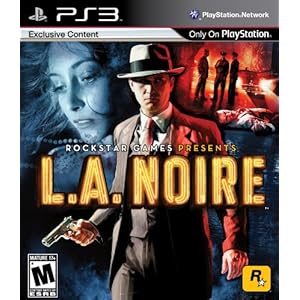
I don't look back on this as fondly as other games on the list, but a lot of that is probably reaction to all the horrible stuff we heard about the game's development and a bit of revisionist history. At its core, Noire is a very fun game that managed to mix adventure game-style mysteries with open world action effectively. The post-war Los Angeles setting was realized beautifully, the facial animation is pretty staggering, and the tale it weaves has all the elements of classic film noir. There are plenty of small issues, but the experience matches the ambition well.
9. Battlefield 3 (PC)
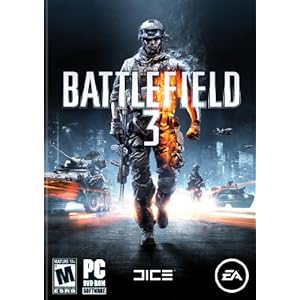
It's really too bad that beyond the graphics, sound design, and a few standout moments, the campaign of Battlefield 3 is otherwise so bland and fails to take advantage of what makes the franchise unique, because they could have helped make the game one of the best shooters in a long time. Instead, it's merely memorable as something that failed in its ambition to beat Call of Duty at its own game. The multiplayer saves it, though, combining all the best elements that they've found over the years into something addictive, rewarding, and very fun to play, whether you can maintain a decent kill ratio or not. And man, it really does look and sound fantastic.
8. Batman: Arkham City (Multi)
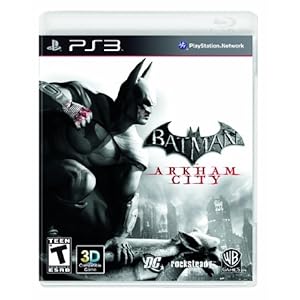
For an open-world game, Arkham City isn't that big, with a map that only takes a few minutes to get across even if you have to glide all the way around its weird shape, and not much to do beyond the main story besides collecting a whole ton of Riddler trophies. But the core gameplay they brought back from the last game is still so good, that actually playing it beats most open-world games on the market. The combat and stealth get a better chance to shine when there's more groups of goons to stumble across, and the more focused stuff once you get indoors is still a lot of fun. It would be hard to capture the thrill of being a super hero better than this.
7. The Witcher 2: Assassins of Kings (PC)
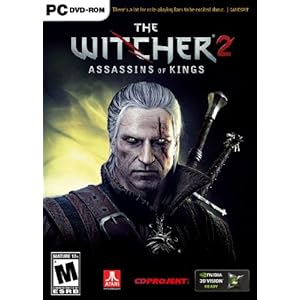
The first game in the series had a lot of cool ideas, but it was ultimately a bit hamstrung by its nature as a sort of strange European RPG by a first-time developer. They used that experience very well though in crafting the sequel, a much better game that smooths over some of the rough edges well enough to let the good stuff underneath really shine. The game looks fantastic, with graphics that compliment the visual design and impress without being flashy, and the gameplay is a solid mix of discovering and learning about the game's world with a combat system that is tough but fun and rewarding. A really nice success story.
6. Deus Ex: Human Revolution (PC)

Another surprisingly good sequel, Human Revolution learns from the mistakes of the last game that tried to follow up on the original classic and stays true to what was actually interesting about it while updating things that needed updating for the modern day. The game is not without significant flaws, notably in the design of the boss fights, but the core experience is so solid that it's hard not to get sucked into it. The game is really meaty, with plenty of interesting content and very little in the way of filler, giving you twenty solid hours of science fiction roleplaying and action and allowing for a variety of approaches to almost every situation. It's hard to really connect with the story, but the act of playing it is always compelling.
5. The Legend of Zelda: Skyward Sword (Wii)

I feel like the Zelda series has gotten a raw deal from many gamers in the last few years, perhaps starting with some backlash there was towards Twilight Princess when it came out earlier in the Wii's existence. Some complaints about the way they've decreased freedom and increased the tedium are valid, but I think sometimes these people are looking for something that they're just not going to get from the series anymore, which has always been meant to be friendly to kids. Taking into account changing standards and some of those now-systemic flaws though, I think Skyward Sword is perhaps the best game in the series since Majora's Mask. After a slow opening, the game opens up, and there's a lot of fun to be found in its world. Trying to tell an origin story again makes for a pretty interesting narrative, the use of motion controls is better justified, and the dungeons are as fun as ever. It's not the game-changing Zelda people probably wanted, but what it is is a very fun and comfortable adventure.
4. Bastion (PC)

A lot of times I get really into smaller games like this despite the gameplay, because their stories and presentations are unique and enchanting. That's true here, but the actual game part is really good as well. Bastion is a short but satisfying action RPG that hooks you both with its myriad of fun weapons and powers and all the ways it has to enhance the whole experience, from the unique setting and art style to the wonderful soundtrack and the unforgettable narration. And it might just have the most affecting story of any game on this list.
3. Uncharted 3: Drake's Deception (PS3)
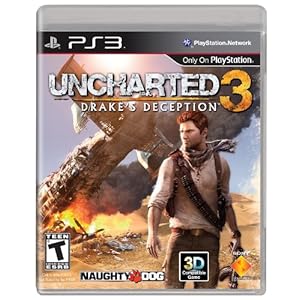
I find it odd that Uncharted seems to be held to a totally different narrative standard than other action games. Most of the time it's fine for a shooter or platformer to jump all over the world for very little reason, but since the characterization and voice acting in Uncharted is so good, people expect consistency in the plot too, and complain if a part of the game is only there because it's cool and certain threads get lost in the shuffle by the end. I understand hoping for a little more, it just seems unfair to me. Anyway, Uncharted 3 isn't the revelation that Uncharted 2 was because of course it isn't, but it still manages a fun mix of shooting, jumping, and puzzle solving, it's still funny and exciting, and its big moments are still staggering in their technical complexity and ability to impress. If it's Naughty Dog's last Uncharted game, it's a great note to go out on.
2. The Elder Scrolls V: Skyrim (PC)
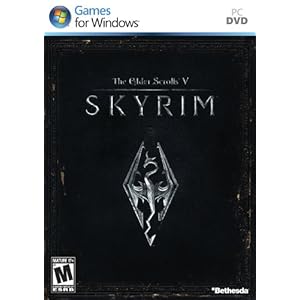
I played Oblivion for well over one hundred hours and called it my favorite game of 2006, so you know when I say that Skyrim is better in almost every way, I must really think something of it. It again captures the joy of exploring and getting to know an immensely large world, but improves on pretty much everything about that experience. Skyrim is a land with an intriguing history and sense of culture, and it's absolutely filled to the brim with cool stuff to do. There are six major questlines all with their own little twists and wrinkles, and their stories are generally much more interesting than what you'd find in the earlier games. There's more side stuff to do, and the basic experience of finding a dungeon and then raiding it for all of its treasures is more fun and less repetitive. If there's one thing the game doesn't do as well, it's come up with individual quests that feel as special at certain memorable moments. But the overall feeling of playing the game for many, many hours is undeniably superior.
1. Portal 2 (Multi)

I said Portal 2 was my favorite game of this generation of hardware, and I stand by it. It's just the right length, with its story mode being a significant chunk of content lasting just the right length, and the co-op being a meaningful addition. The puzzles are just as mind-bending as before, relying less on reflexes and more on your ability to think through a problem, and having plenty of new tricks and elements to keep things fresh the whole time. The story is funny and intelligent, expertly told in ways both direct and indirect, with well-written dialogue being superbly delivered by the small voice cast and the environment being carefully crafted to tell you everything about Aperture you'd ever want to know without saying a word. It's just the best example of both good game design and good execution of that design on this list, and it's my favorite game of the year.
Monday, January 2, 2012
Game Update 19: Some PSN Games
These are all games I got on PSN in 2011 and never got around to talking about. They're all worth playing, although I didn't actually have to pay for half of them.
Street Fighter III: 3rd Strike Online Edition

I got two Street Fighter games on PSN because Street Fighter Alpha 3 was the only one I owned, and I figured I ought to have a couple more, if only for history's sake. Street Fighter III is kind of an oddball, with only a few familiar characters and a whole bunch of strange new ones on the roster. Like there's a weird experimental creature than can change shape and a little goblin guy with one arm. I actually liked it more than the other one I got though, because the animation is kind of amazing to watch, it has a fun and deep fighting system, and the challenges that you're always making progress toward add something to the experience. I didn't manage to actually find any opponents online, though.
Super Stardust HD
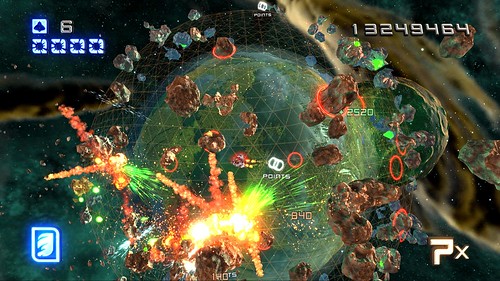
One of many, many downloadable shooters this generation that you control by moving your ship with the left stick and aiming your fire with the right. I never played the original games Stardust HD is based on, but it doesn't take long to figure it out - you fly around the surface of various planets and protect them from asteroids and other threats with a variety of weapons. The game looks and sounds very nice and is pretty smooth to play. I wouldn't have gotten it if it wasn't among the choices for free games after Sony finally got PSN back up last year, but it's a fun little game.
Super Street Fighter II Turbo HD Remix

As far as I can tell this is a graphical overhaul of what was considered the definitive version of Street Fighter II, with a couple other bells and whistles added on. The new backgrounds and characters look nice, but because the game has to stick to the same animation cycles in order to keep the gameplay the same, there's a weird disconnect between the smoothness of the images and the stutter with which they move. I ended up switching to the traditional sprites, though of course then you have the disconnect between the fighters and the backgrounds, which you can't change. Still, the core gameplay is full intact, and though it's not as smooth or modern as Street Fighter III, it's still pretty fun. Couldn't find any online opponents in this one either, though.
WipEout HD

The other free game I got when PSN came back was this, complete with the Fury add-on. All of the various futuristic racing games sort of blend together in my head, but WipEout seems like a popular one, and this HD version of it is enjoyable if not particularly original. The standard races are fun, but the game seems more fresh in its other modes, particularly the ones that Fury added. I'm not a huge racing game guy, but WipEout HD looks really nice and doesn't have any major issues.
Friday, December 30, 2011
Batman: Arkham City

Some people didn't seem to be into this game as much as they were into Batman: Arkham Asylum a couple years ago, but I think the only real difference is that this game wasn't a surprise. People were blown away to play a super hero game that actually captured the essence of being that hero and was a fun experience to boot, and despite doing it even better this time around, a lot of Arkham City is more of the same. The biggest change is obviously in the environment. Rather than exploring the grounds of a large prison complex, you're gliding and grappling your way through a larger city area. Most of the time you end up entering various buildings that end up feeling much like the different locations in Asylum, but there's enough to do outside that the game does end up feeling different.
The main gameplay remains essentially intact, though. You will alternate between investigating crime scenes, using your gadgets to traverse obstacles, and taking on groups of thugs. Those thugs will either be armed, which means you have to use the environment to sneak up on them or take them by surprise, or not, which means you can beat the crap out of them with the game's smooth and always-interesting melee combat system. You basically start the game with all of the gear you had last time and then add even more on top of that, so while it's easy to get overwhelmed and even totally ignore certain equipment, it all ends up being pretty useful if you try it out, and it really sells the idea that you are Batman, along with your ability to instill fear in and then cripple your opponents.
While Arkham Asylum featured a wide variety of familiar faces if you're at all a fan of Batman, Arkham City almost goes too far with bringing out all the villains and allies you can think of. Basically everyone is back fro the first game with a small exception or two, and there are plenty of new ones added in. It threatens to become too much and muddle the story, but luckily enough of the characters are limited to cameos or side content that the game never loses sight of its main plot. It's actually kind of a surprisingly short game considering the scope of its world and the number of characters, especially if you don't spend a lot of time fiddling with the endless supply of Riddler challenges. The critical path probably takes less than ten hours, though it's a lot of fun while it lasts, digging deeper into Batman's character, the history of Gotham, and how exactly the people in charge agreed to section off a part of town and hand it over to Hugo Strange in the first place. It's all kind of silly, but it fits in with the game's unique combination of the sillier and grittier sides of the Batman franchise.
Though the boss fights once again often revolve around either large groups of enemies, an unreasonably huge villain, or both, this time they bothered to make each one unique and actually have their own methods to take them out, which is a big improvement. By removing the one significant flaw the original game had, you could say it's a superior product, though I didn't really feel like it was better, just tweaked and a bit more refined. They did add a new annoyance too, with having to download the Catwoman content, and if you don't have a new copy, you'll have to pay for it. You can finish the game without playing as Catwoman, but it will create gaps in the story, and you won't be able to collect certain Riddler trophies or see a couple of the villains. Actually playing as Catwoman is fine, as she has some unique abilities that make up for the other things she can't do, though I can't say I was ever particularly thrilled when one of her missions came up. The game definitely goes a bit too far with making her a sex object, too. You can make a character alluring without having every line out of her mouth be a double entendre.
The world of Arkham City itself is a somewhat interesting one, and it changes over time as things get worse off for the people inside. I can't say I liked the design of the city itself, which due to its central area being locked off except for an underground path through, takes on a horseshoe shape which is a bit annoying to navigate when you just want to get somewhere quickly. I also thought it could have been easier to locate side missions - I only finished about half of them, with no indication anywhere on how to advance the others besides just scouring the whole place. Just flying around as Batman though is fun, and it's a very well polished game for the open world genre. It's maybe a bit limited compared to other games of the same type, but it's a fair enough trade off. It seems mostly like they just wanted to make another Batman game but thought they needed something to point to so they could advertise how much bigger and better it is, and luckily the increased scope doesn't damage the main game, besides maybe cutting it a bit short. The important thing is you get to be Batman again, and that's still a lot of fun.
Friday, December 9, 2011
Assassin's Creed: Revelations

I honestly was less disappointed when I found out this game was going to star Ezio than I was when I learned the same about Assassin's Creed: Brotherhood. After all, with that game they had already established a willingness to reuse the same protagonist, and it makes a certain amount of sense to have a trilogy within a larger trilogy, that being the one about the series' meta-protagonist Desmond. I don't know that the game released next year will actually be called Assassin's Creed III, and I wouldn't be surprised if it features another new or returning central character, but I am reasonably confident that it will resolve Desmond's story without killing off potential for future games in the series. Revelations does a lot of work toward setting up that sort-of conclusion, both in the resolutions it gives to Ezio and Altair and the small steps forward it takes in the larger narrative. Also, that narrative has hinged on the end of the world happening in 2012, and of course it would be silly to have a game about that come out in 2013 or later.
Revelations was advertised as being a game to finish the stories of Ezio and Altair, and I'd say it does so, though in a slightly odd way. Despite them both appearing on the cover, you will spend the vast majority of the game playing as Ezio again, with only five missions as Altair, all relived through keys Ezio finds (and relived also by Desmond too obviously, in a weird Inception-style layering of realities), all taking place in the Assassin stronghold at Masyaf, and mostly being pretty limited from a gameplay perspective. But Altair actually gets a more purposeful send-off as a character, as we see snippets of his entire lifespan, struggling to keep the Assassins on the right path and make the proper preparations for his descendents to follow their own paths. There are some really strong moments in these missions, that finally made me care about a character who was mostly just a jerk in his own game. Conversely, we do see Ezio accept what the true purpose of his life is and get closure on some things, but there's less of a finality to his arc. Still, he also had some good moments.
Looking at the game itself though, while Brotherhood won me over with what it brought to the table in terms of new concepts and systems for the series, Revelations seemed a bit light on actual new gameplay content that was enjoyable. While the first game obviously established the vital climbing and combat mechanics, and the concept of the series, and the subsequent games added fun features like core combat improvements and an economy that allowed you to purchase better equipment and renovate businesses in exchange for more influence over the world and the ability to recruit and level up new Assassins who could help you on missions, there's not much new about Revelations that I really liked. I will say the hookblade is a very good addition - it doesn't have much effect on combat, but it does make getting around easier by letting you climb a bit faster and use suspended wires all over the city of Constantinople like ziplines.
Otherwise though, the additions were either a wash or actively irritating. Bomb crafting is interesting in theory, but there's really not much that they allow you to do that you couldn't do before in another way. It's not like you need more ways to kill enemies, smoke bombs already existed to allow for obscuring your movements, and there are other methods of distraction like poison or hiring citizens to help. Adding a control component to the assassin training missions provides a new source of revenue but is also a money sink on its own, and the new stuff with notoriety and defending your territory is almost a total disaster. Now instead of permanently taking over Templar strongholds, they can be retaken if you're a wanted man, and the only way to defend them without taking them back again is to engage in an undercooked and uninteresting tower defense-style minigame. Luckily you can avoid that altogether by keeping yourself off the radar, but now renovating businesses increases your visibility, and the methods to reduce it are decreased in number and less effective. It's just more of a chore to build up your power over the city than it was before, and I really don't see the benefit.
On top of the questionable additions to the available distractions from the game itself, the game itself seems a bit slighter than it was on the past. I'm not sure if my perspective is skewed or what, but it definitely felt like a shorter game to me, especially in the second half when the plot kicks into high gear and every memory sequence seems like it's over in an hour or two. There's not exactly a shortage of side content, and I know for a fact there's a number of optional missions I can finish as soon as I get back to the game. But the critical path through the story definitely felt a bit rushed to me, especially in the end, when the game teases what could be a big confrontation but it never comes. It's just like there was supposed to be one last twist and one last big Templar you'd have to track down and assassinate, and that final act doesn't really come. Really, you don't do much actual assassinating in general. Those silly scenes where you stab a guy in the neck and the environment turns into white nothingness and the victim gives a final confession or Ezio just blesses them are a staple of the series, and they're unfortunately in short supply in this game.
It did have some strong spots - the game has the best development of a human relationship in the series, and the underground tomb missions which focus on more specific platforming are better than they've been before, and make a nice effort to remove some of the sterility from the series' level design. I even liked the first person platforming levels you unlock by finding small objects in the city, which aren't terribly fun but are a nice break from the game's regular hustle and bustle and do a good job of establishing an interesting past history for Desmond, though they're light on any real surprises. And of course the multiplayer is back, and it's still fun as long as the other players aren't idiots. Of all the main games in the franchise, Revelations feels the most like a stopgap. It felt less connected to history, and had the smallest cast of characters, and the least momentum in the overarching story. But it did hit a few important beats, and it's still fun just to run around the city and mess up fools, and I'm still looking forward to what's next. It's a bit unfortunate that Ubisoft has felt the need to push out a game every year to keep the series relevant, but I'm not going to pretend I haven't enjoyed playing them every time.
Monday, November 21, 2011
Call of Duty: Modern Warfare 3
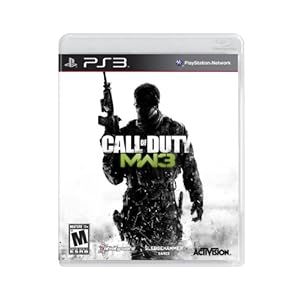
I'm really curious how close this game is to what it would have been had Jason West and Vince Zampella not been fired by Activision and taken a lot of the higher level talent at Infinity Ward with them. Was the plan for the game already in place, or did the people left behind have to come up with the whole thing? If there was a plan, how detailed was it? I'm curious because I had fun with the game, but it doesn't do much besides meet the standards of the previous ones without bringing much new to the table. This is the fifth Call of Duty game in this style in as many years, and both the formula and the graphics engine are feeling a little old at this point. At full capacity, might Infinity Ward have brought their A game and raised modern military shooters to a new level? Or was Modern Warfare 3 always destined to be yet another solid Call of Duty game?
There's nothing really wrong with that, I'm just not sure that I need to play many more of them. Modern Warfare 3 has everything you'd expect and little you wouldn't. There's a campaign that will last you five to six hours which features lots of dramatic explosions and firefights. The Spec-Ops mode returns with plenty of new missions and a survival mode, because every multiplayer shooter needs a survival mode. And there's the traditional online which feels basically the same with a few tweaks and additions. If it's worth it to you, there's nothing really wrong with the package. It's just that it's a very familiar package by now.
One thing in the campaign's favor is that it actually manages to bring the overloaded plot of the Modern Warfare sub-series to a mostly satisfying conclusion, as long as you're okay with the series' practice of resolving story threads by killing off every character involved in them. It seems like shooters are always trying to outdo each other now, and MW3 definitely tries to build that excitement by going as big as possible, essentially portraying what a modern World War III would look like. On one hand you'll be playing alongside familiar characters from the first couple games, chasing down the series' biggest villain, but on the other you'll be hopping all over the place, fighting battles in familiar locations and very extreme conditions. You'll start by saving New York City's harbor from a Russian naval fleet, and then hop to various hotspots all over Europe with your squad of celebrity voice acted comrades. At times the plot justifications for each new location will seem thin, but when all you really want is to shoot bad guys and see exciting stuff happen all around you, it tends to work really well. I don't really buy that Russia would be able to cause this much trouble for the US and Europe all by themselves, but it's an easy thing to let slide. The series' ability to create unique, memorable moments is certainly a boon, as it makes the campaign seem a lot more noteworthy than the one in Battlefield 3, despite featuring similar gameplay and a less technically advanced presentation. The Uncharted series might be the only one that pulls off huge spectacle better in the world of action games.
Not everything is great, though. In what might have been a constraint due to the labor issue surrounding the game's creation, you sure spend an awful lot of time in the campaign driving or riding in vehicles instead of moving on your own. It's not that these sequences are boring, but most shooters use vehicles as a way to occasionally change the pace a bit, and here it seems like a design crutch for when they needed you to kill a lot of guys without finding a more clever way to do it. They did manage to avoid the sort of frustrating choke points that have frequently plagued the series in the past, but instead the game seemed almost too easy on regular, until the final mission which ended up being pretty annoying. You gotta get the bad guy! You only have three minutes! But there's a ton of guys between you and him and they can all shoot you with deadly accuracy the second you leave cover! Go faster! No, slow down and let yourself heal! There are better ways to make a conclusion dramatic than the way they handled it. It seemed odd that some of the biggest twists in the story involved a new character that we didn't have time to really learn much about, and it's hard to be shocked by anything the series does anymore. In the past the series has effectively used the deaths of characters to create memorable moments, but when you get the point where you basically assume everyone is a goner, it stops seeming special.
Also, I'll be honest - I haven't tried the other modes. Battlefield's larger, objective-based multiplayer is more interesting to me, and most of my time is being taken up by other games anyway. Some of the things they've added like ways to get bonuses in multiplayer without being skilled enough to earn a kill streak seem neat, and Spec-Ops was pretty fun from what I played before. I know some people only care about Call of Duty for the online, but I bought it because I wanted to see the end of the Modern Warfare story, and I'm pretty sure I got that. It wasn't exactly a unique or inspirational game, but it was a fun one, packing plenty of interesting moments and enjoyable gunfights into the amount of time it lasted. I'd like to see the series do something really different before I try picking it up again, but it's hard to complain about this as a temporary send-off.
Sunday, November 6, 2011
Uncharted 3: Drake's Deception

Uncharted: Drake's Fortune managed to successfully blend together third person shooting and traversal-based platforming into something that was coherent and mostly fun to play, but it was the kind of thing where most people saw it as untapped potential. That potential was pretty much fully exploited in Uncharted 2: Among Thieves, which greatly improved the graphics, environmental sophistication, dynamism of the plot, and basically everything about the gameplay to be better, creating a unique and exciting shooter that could pull off large, spectacular events like few games even attempt. Really only the God of War series goes for the same concept of the environment changing around you like Uncharted does. It allows its shooting mechanics, which are a bit less solidly formed than some other games, to pass by without too much scrutiny, and makes just seeing what happens next as thrilling as actually playing the game. Uncharted 3 had a different goal - not to capitalize on potential, but to live up to a beloved classic. It's a goal that the game mostly succeeds at, though not without a couple bumps.
For better or worse, Drake's Deception is pretty much a second take on the same concept as the second game - let you play as a guy who trots all over the world, looking for clues, crossing dangerous gaps, shooting every bad guy in sight, and escaping from very dangerous and exciting predicaments. The story has a slightly different focus, feeling like the slightly darker sequel that series sometimes experience, but never veering too far from the lighthearted adventure tone we've gotten used to. A lot more time is spent developing the friendship between Nate and his mentor Sully, instead of leaning towards his romantic interests. It's just as well, since that part of the story plays out in pretty much the same way it did in the first two games. The plot even goes back in time on occasion, to show a much younger Nate, which provides a neat gameplay twist and some illuminating character development. The villain is also different this time, relying less on trying to beat Nate into submission and more on deceiving and outsmarting him. The cat and mouse is fun, though it falls by the sideline after a while.
In general, the last third of the game feels a bit rushed. It takes a more personal approach, showing the hardships and isolation he goes through, something we aren't really used to with this series, and I kind of missed the fun of him having his buddies around. It also results in the ending being undercooked, as we don't really fully learn what the villains are really up to or the meaning of certain plot elements. It's a bit disappointing to feel that way about the end of the game, but the benefit of the game not wearing out its welcome balances it out a bit. In the first two games I was definitely tired of the combat by the last couple chapters and ready for it to be over. That wasn't really the case here, as Uncharted 3, while having a couple annoying moments like every shooter ever made, managed to finish without it become a major burden. The changes to the gameplay from the second game are mostly small tweaks - Nate can now throw back grenades enemies toss at him, and it's less of a hassle to pick up ammo, and in general the encounters do a slightly better job of creating unique scenarios that play to the series' strengths. The platforming and puzzle solving are pretty much the same as they've always been - not too tough, but engaging enough that you look forward to them when they pop up. The game doesn't have any annoying forced stealth sections, which is nice, and they improved on the melee combat, occasionally making you take on groups, letting you worry about guys coming from multiples directions and make use of objects near you for more damaging blows.
And technically, the game is just outstanding. Even when things aren't going crazy, they look amazing. The textures and lighting are fantastic, Drake's dynamic running animations are more natural than ever, and the facial animations look better than ever. And when things do crazy, it's always impressive and memorable. Floating docks and boats rocking in the waves, entire structures turning sideways as you run through them, the ground collapsing underneath you, the plan sequence that it's unfortunately impossible to be spoiled on - these sequences both look incredible and provide gameplay experiences that other games just don't have. Fundamentally, there's not a big difference between climbing a fence and climbing the netting of a cargo truck hanging out the back of a plane, but just the feeling each one evokes is distinctly different. It's just a fun world to run around in, one made more fun by the memorable musical score and great voice acting by the familiar cast, which continues to grow and help create a very enjoyable story.
The single player is a great eight hour experience, that in my mind measures up to the general very high level of quality of the second game, and surpassing it in someways. The multiplayer is also a lot of fun, and helps extend the life of the game. I played through the entire co-op adventure mode with a friend, which was a nice, rewarding challenge, and also tried some other co-op stuff which was a good deal of fun. I didn't actually try any of the competitive stuff, but that stuff never interests me as much anyway. Uncharted 2 will probably be remembered better in the future for being new and original, but Uncharted 3 definitely deserves a spot alongside it as one of this generation of gaming's best action adventures.
Tuesday, November 1, 2011
Resident Evil 5
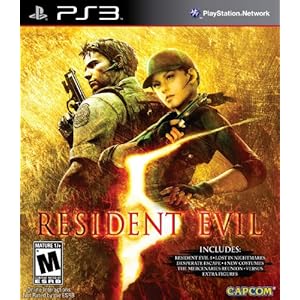
It's not really a surprise that Resident Evil 5 is not as good as Resident Evil 4. It's not an insult to say that either, because the latter is one of the best games to come out in the last decade. 5 takes the core gameplay and design philosophy from 4, and expands on it in a new setting in some ways that are interesting, and in other ways that will leave you scratching your head. It's probably a more ambitious game, but on occasion its reach exceeds its grasp. When it's just following up on what 4 did right, it's a perfectly serviceable action game. It gets sketchy in other places, but at least it never goes completely off the rails.
The biggest change to the series is pretty obvious; the entire game is designed to be played with two people. The first player controls Chris Redfield, a recurring hero of the franchise who's worked out quite a bit since the last time he was seen. The second player controls Sheva, his lithe but functionally identical partner during his mission in Africa, where a nefarious biological arms deal is going down. They support each other through the entire game; healing each other, saving each other from danger, sharing equipment, and working together to get past certain obstacles. Even if you're playing alone, Sheva will still be there, controlled by the AI. This is the way I played the game, as more than two years after the game came out I didn't like the odds of finding a reliable co-op partner on the PS3. For the most part, the single player mode works just fine. Sheva stays out of danger reasonably well and isn't overly wasteful with her ammo. There are some situations though where she's kind of a millstone, notably when it would be best for no one to use any bullets at all or when the correct strategy is to attack an enemy from two directions at once. And unfortunately, these situations seem to pop up more frequently as you continue through the story. I was genuinely annoyed by the execution of the one player mode on a couple occasions before I managed to get to the end. All things considered though, it could have easily been worse.
Besides the two protagonists, it's more or less more of Resident Evil 4. You work your way through African villages and swamplands, eventually reaching more unexpected areas and the inevitable top secret research laboratory near the end. I never really stopped to think too much about the whole race thing. It is a bit odd to be playing a game about shooting a bunch of African civilians, though to be fair they're fairly racially diverse and trying to kill you. There were definitely some weird choices that seemed to be the result of ignorance or insensitivity though, especially involving the more natively tribal enemies you eventually run across. Just looking at it as an action game about fighting zombie-like monsters though, as well as their many amorphous and/or insect-like allies, it does a pretty good job of keeping things fresh and reasonably challenging without getting too frustrating. I became less happy with the general design as things went on, though. A chapter taking place in an underground temple was interesting in theory but not especially well executed, and later they implemented some pretty sloppy cover mechanics and poorly thought out boss fights that the controls didn't really support. When you're just trying to stay out of arms reach of disorganized, mindless hordes, Resident Evil 5's controls are fine. When you have to worry about guys firing guns and coming at you from multiple directions though, it gets dicey. It's never too bad to stop the game dead, but it probably wasn't the best direction to take the second half of the game.
As far as bringing Resident Evil to the current generation, I think they did a good job. The graphics still look nice now, with some really good character modeling and animation, especially on the main characters. The sounds are very familiar if you've played 4, and still work effectively. The voice acting also is a bit less terrible than series fans are used too, though some characters are just wretched in that way where you can't tell if they were serious or not. The story attempts to connect the Las Plagas plot from 4 with the Umbrella and Wesker stuff that came earlier in the series, and does a reasonable job of doing so, though honestly the entire history of the series' fiction is some pretty silly, stupid stuff. It's a weird pastiche of supernatural and science and horror and action, and while I kind of enjoy the absurdity of it all, I would hesitate to believe anyone who claimed to know whether this was actually going anywhere or care that it did. It's flimsy justification to have a game where a couple of special forces guys fight zombies on motorcycles, giant pulsating piles of tentacles, and guys in trench coats who look like they walked off the set of The Matrix. And that's all it really needs to be. The Gold Edition packs a bunch of extra content, mostly all the downloadable stuff that was released in the period after the original game came out. I haven't actually dug into that stuff yet, but it certainly seems like plenty of value for the package. It would have been really hard for 5 to reach the classic status that 4 did, and it didn't reach that goal. But it's still an enjoyable game anyway.
Friday, September 30, 2011
Resistance: Fall of Man
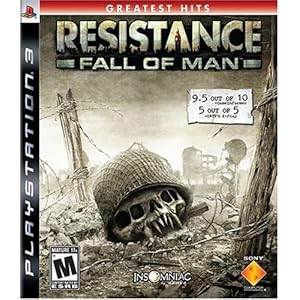
Despite being a huge fan of Insomniac's Ratchet and Clank series, I had for whatever reason to this point avoided trying their new franchise for this generation, Resistance. Now I wish I had tried it sooner, but not because it was really good and I was missing out. The first Resistance game was a launch title, and while it's probably above average by that standard, it definitely feels every bit like the five year old game that it is. Not only is it not up to the level of subsequent, groundbreaking games like Call of Duty 4, it doesn't even learn some of the lessons that earlier games like Half-Life 2 taught. There are just fundamental issues with the way it's designed that clash with the basic concepts that make today's shooters more fun than older ones. It's not a bad game, but I'd call it fairly mediocre. And while other games I'd say the same thing about perhaps had some interesting ideas and just couldn't pull them off successfully, Resistance is sort of the opposite; it's pretty competently put together for a game made in 2006, it just never gets very interesting.
I had always assumed that Resistance was about aliens invading the planet before World War II could break out, but that's not actually the case. The apparent alien antagonists of the series are actually people that have been infected by the Chimera virus and transformed into mutated, super-strong soldiers, and given access to powerful technology. They swept through Russia and then Europe, with the game beginning with you as Nathan Hale, an American dropped into England to try and help defend that country from being assimilated as well. Nathan quickly becomes infected with the virus along with the rest of the survivors from his unit, but for some unknown reason he manages to fight against it and stay conscious. It's also unknown what the source of the virus is, whether it's natural or created, though I'd suspect the latter considering all the technology that's been somehow created to develop the virus' victims into an army and equip them for battle. That raises another question about who exactly would be behind this, but the game isn't about answering all of these questions so much as just throwing you into a messed up, depressing situation and making you try to fix it, mostly by shooting a lot of guys.
And that's essentially what you do in the game. Levels usually revolve around putting you in some war-torn English village or city, and giving you a fairly linear path to run down while you shoot a ton of Chimera. They mix it up with the occasional vehicle sequence or a battle on a larger scale with some allies on your side. Much like Ratchet and Clank, the game tries to get a lot of mileage out of its unique weapons, although they aren't as successful as they were with their other franchise. There are basics like an assault rifle and a shotgun (the latter of which is useful only for mop-up duty, yet you inexplicably find ammo for it all the time in situations where its use isn't appropriate), but also a handful of more elaborate guns, some designed by the Chimera and some by your side. They all have a hook, like a machine gun that has tags that can cause rounds to home in on an enemy or another that you can eject the magazine from to turn it into a quickly expended, floating turret. Unfortunately, several of these only have very limited functionality, or are limited otherwise by a silly limitation. For example, the sniper rifle can be very effective due to its ability to slow down time (don't ask me), but you can only carry twelve rounds for it at once, despite being able to hold hundreds of bullets for the other weapons at the same time. I understand placing similar restrictions to try to keep things balanced, but that one just seemed particularly silly.
The game could be fine with a less-than-completely-satisfying arsenal of weapons, if the enemy and level design was good enough, but I think there are problems there too. The biggest issue is that the combat is set up a lot like the Ratchet and Clank games, where enemies will frequently come at you in swarms and fire slow-moving projectiles at you, which you have to avoid while returning fire. It works fine in Ratchet when you have a full view of the action and a very agile character. But Resistance is in first person, and Nathan isn't very fast, and you often just get pelted with tons of damage that you can't avoid effectively, instead of a more traditional shooter where you have a certain chance of getting shot that you can use cover and smart movement to avoid the risk of. The problem is increased by the game's strange hybrid health system. You can regenerate healthy by avoiding damage for a certain amount of time, but you can only heal up to the nearest 25% mark. So if you get hit for 20% damage, you can heal up to full, but if you get hit for 30%, you can only recover to the 3/4 level without finding a health item. It's a weird system that has no real benefit, and it makes you wish they had picked one type of health system and just gone with it. The encounters in the game rarely get more interesting than just a new swarm of bad guys, and while there's a decent variety to just what type of weird monster thing will be attacking you, few of them bring an interesting challenge. They either run at you and are pretty easily handled, or shoot at you from a distance and can be kind of a pain to deal with.
As I mentioned before, there's a technical competence to the game that makes it playable. There's a simple flatness to the graphics, as the environments and characters aren't as detailed as we've come to expect, and the sound design is fairly standard too, with functional sound, repetitive music, and voice acting that does little to spice up a pretty standard story. But it all fits together into a coherent setting, and a somewhat interesting universe, with possibilities that the two sequels may or may not have successfully explored at this point. I had enough fun early on when I was discovering new weapons and just getting used to the game, but that eventually turned to boredom and then frustration once the newness of everything worn off and I was left with an increasingly familiar and difficult challenge. At no point could I really point at the game and say that something was broken. All I could say was that I wasn't having fun, and there was no indication that the game was interested in changing that. They just stretched what they had for too long a period, perhaps believing that the game had to be a certain length to be acceptable, and perhaps not having enough development time to create more interesting and unique situations with the launch of the PlayStation 3 looming. This was before games like Call of Duty 4 made it okay to have a campaign that only lasted around six hours, after all. I wish I could have liked the game more, but the simple fact was I didn't. I got the dual pack which included the second game, so hopefully I'll have more fun with that one.
Sunday, August 21, 2011
Tomb Raider: Underworld
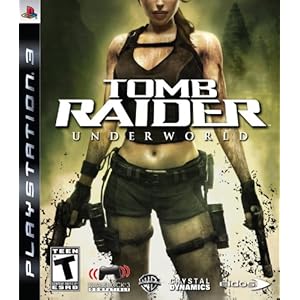
I'm not sure how I would have reacted to this game when it came out a few years ago. The game would have still been extremely glitchy, but it's hard to say if it would have been as unacceptable then as it is now. Were the two Crystal Dynamics Tomb Raider games from the previous generation as buggy as this? They were still fresh in my mind back then. They probably couldn't be, because the fact that they were actually totally playable is what saved the series from getting completely buried. Bringing the series to a new, higher standard of hardware should have resulted in a more polished experience, not severely less. The graphics are technically superior and the grappling physics are better, but that's about the only improvement they made on the last couple games. Lara constantly clips through pieces of the environment and fails to leap in the direction you're pointing with alarming frequency. The camera is easily the worst I've had to use in a game this generation, and the game's concept of falling damage is amazingly silly.
It's like they're going for a certain level of realism with the series (physically, anyway, because the plot is filled with winged demon ladies and magic spells), and Lara can't fall even 20 feet without taking damage and probably dying, bouncing off the floor in hilarious fashion. They're not consistent enough to make this work, though. Lara can get shot multiple times and feel fine after using a health item, but she can't safely drop from distances other game characters can without a hitch? While clinging to a wall, she can leap straight up and clear a distance greater than her own height. No human alive can do this, yet she gets killed when she drops a couple stories. The combat isn't any good, either. It's a great example of the kind of combat that exists only because the developers thought they needed to break up the platforming and puzzles once in a while. Lara's pretty acrobatic, but there's no real thrill to the act of fighting. You stay away from enemies and hold down the fire button until they're dead. They didn't even bother making any boss fights like they did in previous games. When the best feature of your combat is a meter which when fully charged allows you to make it go by faster, maybe you don't need combat at all.
Despite these issues, and they are big ones, I don't hate the game. It takes you to some nice looking locations and let's you explore complicated temples filled with elaborate but logical puzzles. Climbing and jumping is still innately pleasurable, even if Lara can't jump straight and seems to have terrible balance for someone so athletic. The plot has a mildly intriguing crazier-Indiana Jones thing going on. It delves deeply into Norse mythology and how it has impacted religion throughout history, which is kind of neat if a bit arbitrary (Okay, so the Mayans were totally just biting on Viking stuff they found?), and it also wraps up threads from the two previous games, forming a sort of trilogy. I don't know if they're rebooting the series again now just because they want to or because of some reaction to this game, but I guess I'd believe either one. My experience with the game was much more up and down than it was with the first two, mostly because of the technical issues. But it does naturally extend from them, and adhere to a lot of the same ideas that made the franchise interesting in the first place, and influence modern AAA games like the Uncharted series. Of course, Tomb Raider was itself influenced by other previous games, but that's the incestuous nature of game design.
The game does have two downloadable episodes that continue the plot, which I have no access to due to them being exclusive to the Xbox 360. Hiding the ending of the game behind additional paid content and making paid content exclusive to a subset of your user base both seem like bad ideas to me, and combining the two is even worse. I watched video of the episodes online though, and I have to say I don't mind the results here terribly. They do take place after the ending of the game, but they feel more like epilogues than the real ending of the game. The ending that was already there feels properly climactic, and these episodes are just a bit more content to finally put a couple threads to rest. It still seems poorly thought out, but I don't really feel cheated. If this is the last we see of this continuity (I don't really know where Lara Croft and the Guardian of Light fits in), then it ends on a fine note, if a bit of an odd and clunky one.
Tuesday, August 9, 2011
Portal 2
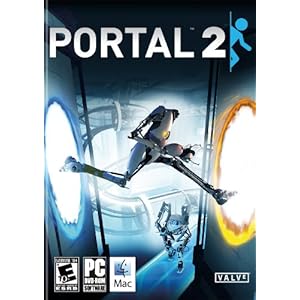
I played through this game's single player mode on PS3 around when it came out earlier this year, but because of the issues Sony had getting PSN back online, by the time I was able to get the game online (and activate my free PC copy), my friends who also bought the game had already played the co-op, and I wanted to experience it the first time with someone else who hadn't seen the solutions before either. I ended up waiting until this weekend, when another friend finally bought it and we blasted through the mode in one day. All it did was cement my position that Portal 2 is my favorite game from this generation, one of the best games ever, and also probably the funniest.
In a lot of ways Portal 2 is just more of Portal, but when Portal was already one of the most acclaimed and interesting games to come out in years, that's not really a bad thing. The sequel returns you to the same general environment of Aperture's underground laboratories, but expands on their scope exponentially in multiple directions. A lot of time has passed since the first game, and you get to explore the facility's entire history, from when it was first created deep at the bottom of a mine, and moving forward through time as they built newer and more advanced additions on top of the old ones. Part of the series' fun is the vaguely sinister nature of the environment, which is enjoyably disrupted by the games' sense of humor but still detectable through little areas you stumble upon, and the second game really explores this, creating one of the most intriguing locations ever in a game, both from an art and gameplay perspective. You frequently go between sterile, carefully managed testing chambers and the industrial decay that surrounds them, a juxtaposition reflected by every aspect of the game. The frequent changes in the feel of whatever area you're in at the time keeps things constantly fresh, and along with the clever gameplay and fantastic humor, you have a single player campaign that is longer, deeper, and ultimately more satisfying than the original's.
There's definitely a detectable shift in the general puzzle design between games. Besides replacing bouncing energy cores with laser beams, all of the discrete elements from the original return, along with several new ones, such as energy-based bridges that can be redirected with portals and various kinds of gels that alter the properties of the surfaces in the environment. The increased number of variables to work with is accompanied by a shift away from experimentation and acrobatics in the puzzles, as solutions are generally more constrained to prevent overwhelming the player with all the possibilities inherent to the new elements and require less physical skill with the controller, letting players instead focus on thinking through the proper way to address all the obstacles present. I can see why some players might regret the slight loss in freedom this represents, but I thought the puzzles were extremely well-designed and constantly thrilling to solve, a feeling I don't think will go away that quickly on periodic revisits.
And as I already briefly mentioned a couple times, the writing and voice acting are fantastic. Valve has always done a great job of having a player experience a story through the act of playing a game, though in recent years their games have gotten more and more dialogue-heavy, usually to great comedic effect, and Portal 2 is possibly the culmination of that effort. GLaDOS was already wickedly funny in the first game, and having her be only one of a few characters in the game was a great idea. The two most significant new characters are Wheatley, a bumbling robotic friend who helps introduce you back into the world of Portal, and Cave Johnson, the founder of Aperture who had been mentioned previously in content from outside the original game and who lives on in a series of recordings in the facility's lower levels. Wheatley is played very well (and often ad-libbed) by The Office co-creator Stephen Merchant, and Cave is voiced by J.K. Simmons, who is consistently one of the most affable presences in Hollywood and does a great job as well. Johnson's dialogue is necessarily limited to solitary rants, but frequently GLaDOS and Wheatley are able to play off each other to great comical effect. It's all really memorable material without falling into the Internet meme pit that bits from the first game like all the cake-talk did. As always the script does a good job of creating a setting and telling a simple but interesting plot without having to directly explain it to you, and the ending is one of the single most gripping and unexpected things I've seen in a game.
And that co-op mode was worth the wait, as well. Just the inherent possibilities of what having two sets of portals instead of one is exciting, and I was glad to see the game fully capitalize on that potential. More portals means more complex set-ups, but even beyond that, having two sets of eyes and two brains working together on a problem means Valve could design tougher challenges, knowing that they had more freedom to try truly off-the-wall stuff and could expect players to roll with it. With the Left 4 Dead series they found an intriguing way to force players in a shooter to work together in order to survive, and they continue to have success here in making a unique experience out of cooperation. With the two player characters being easily-reconstructed robots there's a perfect opportunity to encourage experimentation and the occasional bit of messing with your buddy as you know there's no true consequence for a bad idea and the challenge is in figuring out the puzzle, not avoiding death. They also felt the freedom to bring back some of the more skill-based concepts like momentum, and find ways to combine elements that never interacted in the more straight-laced single player, like the previously mentioned bridges and gels. It's also just another showcase for GLaDOS, as she gleefully scolds the two robots and tries to set them against each other while they work towards whatever she feels like making them do.
All this and I haven't mentioned the yet-again entertaining and insightful developer commentary, the great use of music (not just in the background during dramatic moments, but also as a gameplay clue with the various new toys), the clever use of trophies/achievements and title cards, and the fact that they're still finding ways to make the Source engine impressive seven years later. Valve is easily one of my favorite game developers, and they seem to only cement that further with each new release. It's a testament to what they do that despite the continued radio silence on anything related to Half-Life, I find myself only intrigued by what's possible in the future rather than truly disappointed.
Monday, July 11, 2011
Bayonetta

It would be hard for a video game to be more ridiculous than Bayonetta without becoming intolerable. Plenty of games have gone in a similar direction with over-the-top action sequences and absurd stories and presentation, but I can't recall seeing one take it all as far as this game. It helps a lot that the game knows very well that it is ridiculous, and is sort of winking the entire time. Bayonetta is sort of the typical sexy bombshell protagonist that sometimes gets exploited, but her feminine proportions and the camera angles she's shot at are so insane that it's obvious her entire existence is tongue-in-cheek. It helps that she has such a delightfully wicked personality. But anyway, she's far from the only wacky thing in the game. The whole premise is that three different realities live on top of each other; basically Earth, heaven, and hell. Witches and sages serve the dark and the light, and they can travel between the realities. Bayonetta is a witch, and she kills the hell out of angels through the entire game in order to prevent someone from resurrecting God. The plot isn't that strange for a Japanese game, but the panache with which the world is brought to life and then repeatedly exploded is pretty exceptional.
I guess it speaks to how much I like God of War that I often like these kinds of stylish action games best when they remind me of it. I've had plenty of fun with the kinetic, desperate action of Devil May Cry and Ninja Gaiden, but that action is about all there is to them besides some silly cut scenes serving a boring plot. A lot of what I really like about God of War is how it invests you in all of the mayhem you cause by getting you on Kratos' side, and making the setting seem like it exists beyond the hallways and arenas you're fighting in. Both of those are definitely present in Bayonetta, along with the simple platforming sections and gigantic boss fights. All it's really missing are the interesting puzzle elements, with those bits usually boiling down to finding the right object to smash. It's still a game that focuses mostly on the combat, which is fine when it's as crazy and enjoyable as everything else about the game.
They do a good job of slowly expanding your options in battle - Bayonetta starts with a fluid and entertaining two-button combo system, an arsenal of fire four guns (two are strapped to her heels), the ability to slow down time for everyone else with a well-timed dodge (the complete absence of a block button means the combat is always fast paced and intense), and a magic meter that lets her use her hair for especially damaging blows or execute torture attacks, which are the baseline for the absurd brutality she puts her foes through. As the games goes on you pick up some new moves and weapons that expand your choices and keep things fresh. Unfortunately, the game was a bit too hard for me on normal after a certain point, and rather than replaying levels to pay for upgrades and items I opted to switch to easy mode. The game was still a lot of fun the rest of the way, but I felt like I was missing something - I didn't manage to find any new weapons after a certain point, and the way some things became automatic in that mode made it seem like I wasn't getting the full experience. Still, I appreciated the depth and smoothness of the combat, even if I didn't fully master it myself.
The regular fighting makes up most of the gameplay, but Bayonetta does find occasion to mix things up. The light platforming elements did the job of giving you a break from the insanity to observe the strange world the game takes place in, and there are a few opportunities to use vehicles in specific sequences that are their own brand of out of their mind. It's a tight eight hour experience, only really dragging towards the end when it seems like the game should have ended already and just won't. If an overly long denouement is the only real mistake caused by the game's everything-including-the-kitchen-sink approach, then the project is a remarkable success. The PS3 version of the game is famous for its technical inefficiencies, but I guess it's been patched enough to where it really isn't a major problem at this point. The loading times were generally fine, and while I did notice some slowdown, it only seriously impacted the gameplay in a single (large) room late in the game. Considering how much stuff was crammed in the game, I thought it was fine. It looks pretty nice too, though the use of mostly-still frames in certain cut scenes felt kind of cheap. The voice acting is marginal but Bayonetta herself is great, and the music works even if it's a bit repetitive. There also seems to be plenty of stuff in the game to extend its life beyond the initial play-through, especially if you're skilled enough to unlock it. At the price you can find it for now, Bayonetta is definitely one of this generation's best pure action games.
Sunday, June 26, 2011
Bioshock 2
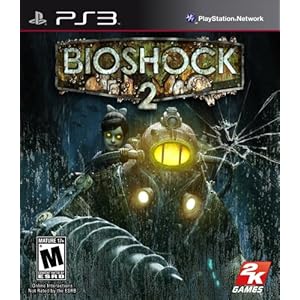
The most interesting thing to me about Irrational Games taking the Bioshock name and sticking it on a game that takes place in a city in the sky is what it means for this game. When Bioshock 2 was announced (or really just when someone at 2K said there would be sequels), a lot of people complained that the game didn't need it, that its concepts had been explored and its story resolved. I didn't dislike the concept of another game, because I loved the original and thought that more could be done with the setting. But when they started showing off Columbia last year, the complaints started to make sense - if you can continue the franchise with the same core concepts without returning to the same location, then why did this game need to exist? It just makes things confusing. If Bioshock doesn't mean Rapture, then why does this game get the "2", instead of the one that really pushes things forward? Bioshock 2 isn't a bad game, but subsequent announcements have made it feel less like a full sequel, and I thought it focused on the wrong part of the original to expand upon.
The game takes place almost a decade after the first, with the original protagonist long gone, putting you in control of one of the first truly successful Big Daddy experiments, a man who found the city on his own and was then bonded to Eleanor, a Little Sister who happens to be the daughter of Sofia Lamb, a woman with opposite ideals to Andrew Ryan who took over the city after his death. Playing as a Big Daddy doesn't fundamentally alter the gameplay experience, as you still acquire Plasmids and weapons and use them in conjunction to fend off Splicers, gain control of Little Sisters, and make your way towards the finish line. I do like that the weapons are different, with at least a graphical facelift on some of the similar ones and some new features, and the brief underwater segments are a nice break from regular play. The Plasmids are pretty much all the same though, and while dual wielding makes things a bit smoother, it's pretty much the same game. The new areas seem to fit in with the setting that previously established and the new characters are just as out of their minds as the old ones, though they all still look like the same kinds of places and the series' brand of insanity in its characters is pretty familiar by now.
While its at its core a very similar experience, on area they seemed to really ramp things up is combat, which was honestly no one's favorite part of the first game. There's just more of it you have to do, assuming you go after the Little Sisters in order to buy the power-ups you'll need to get by later on. In the first game you had to kill a Big Daddy in order to rescue or harvest the girl he's protecting, but now to max out the Adam that pays for your upgrades, you have to kill a Big Daddy to grab her in the first place, protect her from waves of enemies as she draws Adam out of two separate corpses, and fight one Big Sister on every level, which is basically a faster and more dangerous Big Daddy. I just got fatigued at a certain point fighting the same kinds of enemies over and over again. Setting up traps and mixing and matching Plasmids and weapons is fun to be sure, but after a while you get bored with experimenting and just want to get to the end. I actually wonder now how hard it would be to play through the game skipping most of the Little Sisters,which would reduce your abilities but also reduce the time you spend fighting everyone. The game practically overwhelms you with supplies you can find in every nook and cranny, and even if enemies kill you you just respawn at the nearest Vita-Chamber anyway.
What really impressed me and most others about the first game was the atmosphere of the unique setting and the story. The problem with Bioshock 2 is that the setting is no longer unique, and the atmosphere is less effective when you've already played a full game using it. They're just out of tricks at this point. The first game wasn't really scary, but there was something fascinating about exploring a city intended to be an underwater utopia that went completely to hell very recently. All Bioshock 2 can do is more of that, and after at least 25 hours total spent in the city, I'm kind of over it. By the last couple levels I was just tired of picking up giant tape recorders and listening to one more sad story about how things went wrong. The plot of Bioshock 2 does a nice job of building off the first and arguably has a much better conclusion, but it also doesn't have a single moment as singularly memorable and powerful as the one from the first game that everyone remembers. There are certain parts of the last couple areas that are as inspired as anything the series has done, but by that point I just wanted to be done with it. I'm not really sure what it is, because usually I'm fine with sequels, and I played the first game way back when it came out so I should have been fully ready for another by now. I guess there's just a certain feel to the experience that made me only really need to go through it once. Or maybe the combat in the first game was easy enough that I could overlook the fact that it wasn't what interested me about the experience, while this time it was a struggle to enjoy the other parts of the game because of the constant fighting. In any case, it is a fun, well made game, but not the great one its predecessor was. In any case, I'll still check out the add-on that everyone raves about.

































